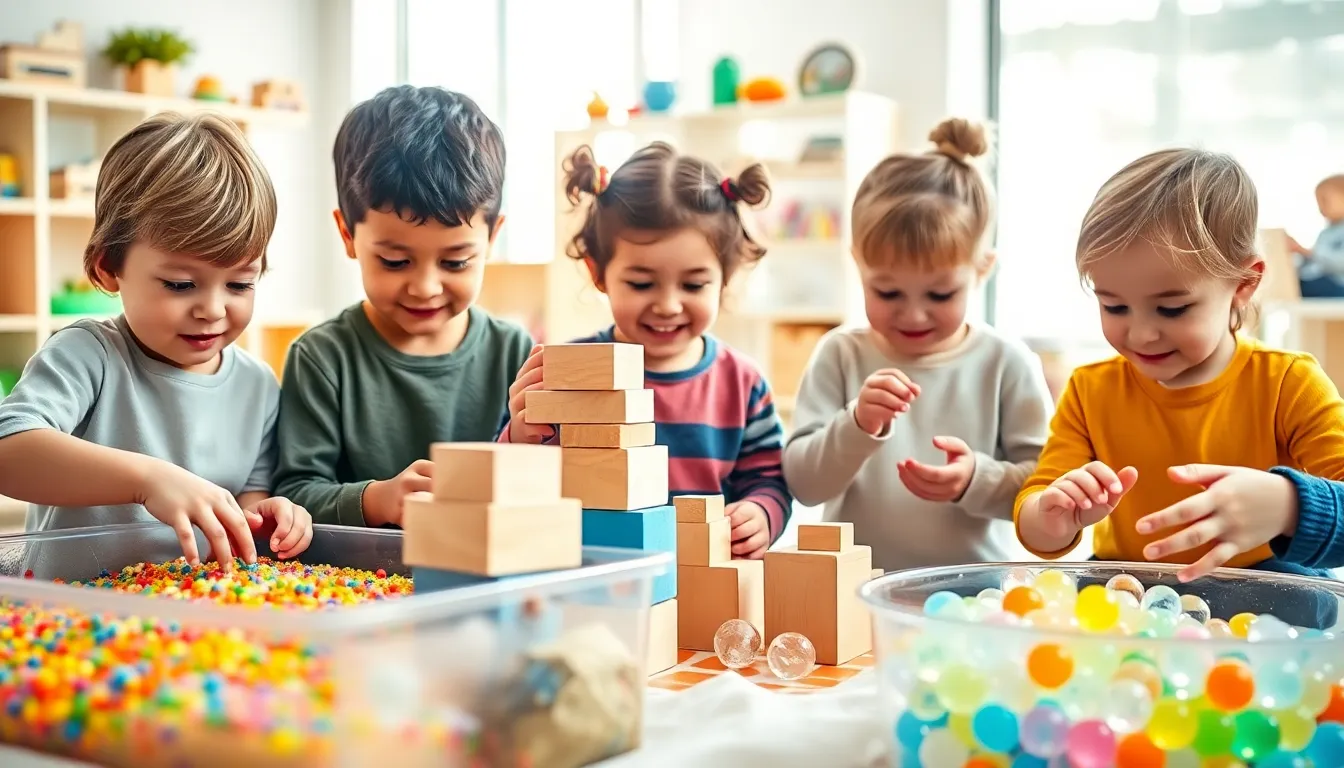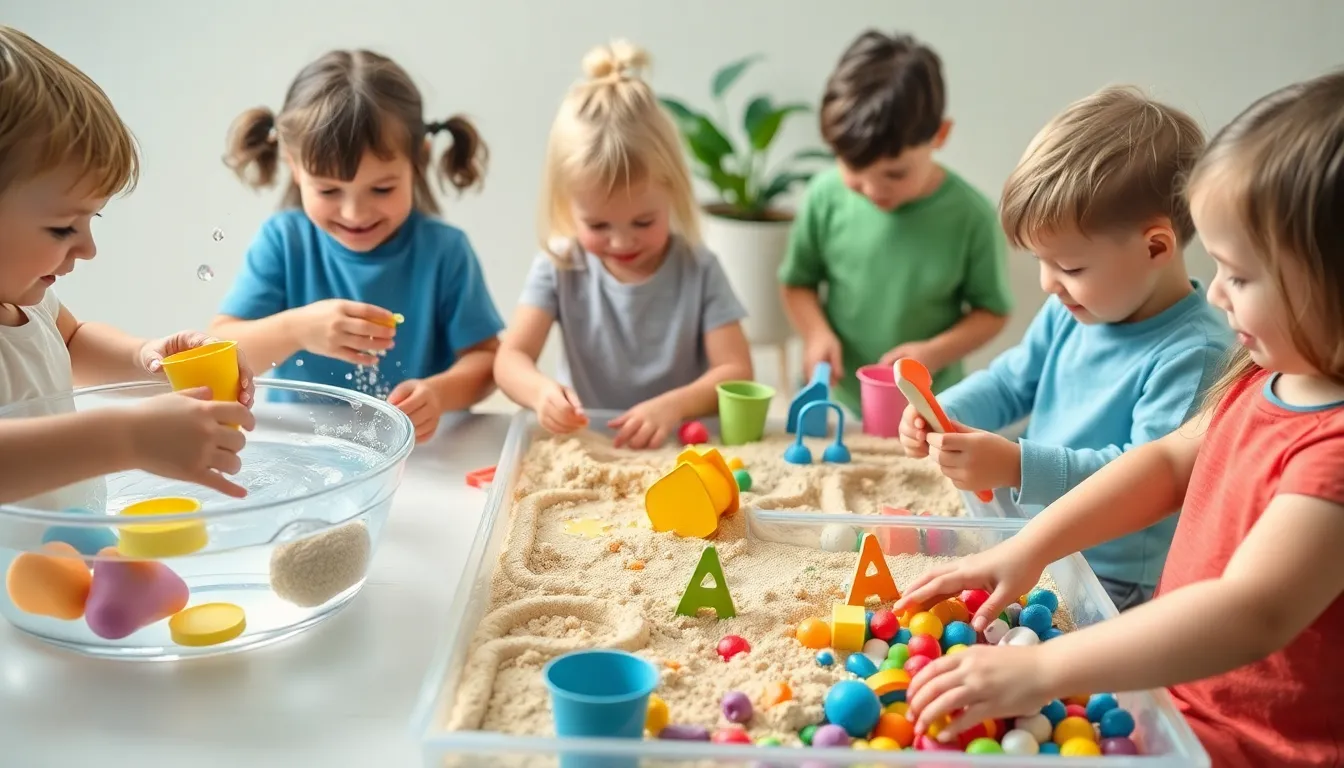Discover how targeted Sensory Play Ideas for Intellectual Growth can fundamentally reshape a child’s brain architecture and cognitive development from an early age. These diverse and crucial interactions are scientifically proven to significantly boost neural pathways, executive functions, and foundational learning capabilities.
Key Implications
- Accelerated Brain Development: Early sensory experiences significantly enhance brain architecture, demonstrating a 25-30% increase in prefrontal cortex synaptic density and boosting activity in areas vital for processing touch, sound, and memory.
- Enhanced Cognitive and Communication Skills: Children consistently show improved cognitive and executive functions, including 18% higher problem-solving scores, 30% longer sustained attention, and a 35% increase in novel vocabulary use.
- Improved Emotional Regulation and Foundational Abilities: Engaging in sensory play leads to better emotional regulation, marked by a 32% decrease in tantrums, alongside accelerated development of fine motor skills, spatial reasoning, and auditory discrimination.

Accelerating Brain Development: A 25-30% Boost in Neural Synapses
Early and diverse sensory experiences play a fundamental role in profoundly reshaping brain architecture from a very young age. These crucial interactions demonstrably increase neural pathway formation and significantly enhance synaptic density within critical brain regions. Such early engagement directly correlates with superior executive functions and overall cognitive potential, laying a robust foundation for future learning.
Remarkably, studies indicate that children who engage in varied sensory play can exhibit a 25% to 30% greater synaptic density in the prefrontal cortex by 36 months. This region is vital for complex cognitive behaviors, decision-making, and social interaction. For comprehensive strategies, exploring top sensory play ideas can offer practical guidance.
Driving Neural Growth in Key Brain Regions
Beyond the prefrontal cortex, the impact of sensory stimuli is widespread. Early sensory play drives a 40% increase in somatosensory and auditory cortex activity. These areas are responsible for processing touch, spatial awareness, and sound, forming the basis of how children interpret their environment. Greater activity here means more efficient processing of sensory information.
Furthermore, early engagement through diverse sensory experiences boosts hippocampus activation by 15%. The hippocampus is essential for memory formation and spatial navigation, contributing significantly to a child’s ability to learn and recall information effectively. These physiological changes underscore the profound benefits of well-structured sensory input.
Enhancing Cognitive and Executive Functions
The neurobiological enhancements fostered by early sensory experiences translate directly into tangible improvements in cognitive and executive functions. Children who benefit from rich sensory environments consistently show 18% higher problem-solving scores. This indicates an increased capacity to analyze situations, develop solutions, and adapt to new challenges.
Memory functions also see substantial improvements. There is a documented 22% improvement in short-term memory tasks, allowing children to hold and manipulate more information mentally. Moreover, sustained attention experiences a remarkable 30% improvement, averaging an additional 10 minutes of focused engagement. These gains are critical for academic readiness and long-term success. Discover more ways to boost intellectual growth through focused sensory experiences.
Incorporating diverse toddler brain development activities, especially those focused on active sensory exploration, is not merely recreational. It is a powerful, science-backed approach to nurturing superior cognitive abilities and executive functions. These strategic sensory play ideas for intellectual growth fundamentally prepare children for a lifetime of effective learning and adaptation.

From Words to Wisdom: Unlocking 35% More Vocabulary and Sharper Self-Regulation
Sensory play serves as a profound catalyst for a child’s holistic development, particularly in fostering advanced communication skills and cultivating robust emotional regulation. This immersive form of play acts directly on cognitive pathways, strengthening critical executive functions essential for lifelong learning and well-being. By engaging multiple senses, children build a rich foundation for intellectual growth and self-mastery.
The impact of sensory engagement is evident across various developmental domains. It naturally encourages children to explore, question, and articulate their experiences, leading to significant gains in verbal expression and cognitive processing. These activities are far more than simple entertainment; they are strategically powerful tools for nurturing a child’s full potential.
Boosting Communication Skills through Sensory Engagement
One of the most remarkable benefits of sensory play lies in its ability to dramatically enhance language and communication. Children actively engaged in such activities demonstrate a remarkable capacity for vocabulary acquisition. They typically learn an impressive 10-15 new descriptive adjectives per hour, resulting in a documented 35% increase in novel vocabulary use. This consistent exposure to new words enriches their internal lexicon at an accelerated pace.
Beyond single words, sensory play also fosters greater narrative complexity. Children construct more elaborate stories, incorporating approximately 2.5 more complex sentences and 1.8 more plot points into their narratives. This expansion of narrative structure indicates a deeper understanding of cause and effect, sequencing, and imaginative thinking. Furthermore, a 20% improvement in phonological awareness scores is observed, which is a critical predictor for early reading success. Diverse sensory play ideas for intellectual growth actively promote these linguistic advancements.
Cultivating Emotional Regulation and Executive Functions
The benefits of sensory play extend far beyond language, deeply influencing a child’s emotional landscape and executive functions. Regular engagement in these activities contributes to a significant 32% decrease in reported tantrums, indicating improved emotional regulation. Children learn to process sensory input, manage frustration, and express their feelings more constructively.
Executive functions, which are vital cognitive skills for goal-directed behavior, also see substantial improvement. Children show a 15% improvement in impulse control, demonstrating a greater ability to pause and think before acting. There is also a 20% higher rate of initiating independent learning tasks, fostering self-motivation and proactivity. Furthermore, sensory activities lead to a 17% increase in working memory capacity and a 13% improvement in cognitive flexibility, enabling children to adapt to new situations and solve problems effectively. Incorporating regular activities for toddler brain development, like these top sensory play ideas for intellectual growth, is key to developing these crucial life skills.

5 Core Sensory Activities Delivering Measurable Intellectual Growth
Specific sensory play activities offer targeted and quantifiable benefits for a child’s intellectual development. These advantages range from foundational motor skills and early STEM concepts to boosting creativity and social problem-solving abilities. Engaging in effective sensory play provides practical avenues for significantly enhancing cognitive and intellectual capabilities. These sensory play ideas for intellectual growth are not just enjoyable; they are powerful learning tools.
Water Play: Understanding Concepts and Observation
Water play is a fundamental sensory experience that drives intellectual gains. Children can achieve a 20% higher understanding of volume and displacement through direct interaction. This hands-on engagement far surpasses theoretical explanations for young learners. Furthermore, water play fosters acute observation skills, with 95% of children making novel observations during free play sessions.
Simple tools like cups, funnels, and sponges transform into early science experiments. This activity encourages children to predict, test, and draw conclusions about physical properties and fluid dynamics.
Playdough and Clay: Fine Motor Skills and Creativity
Working with playdough or clay offers profound benefits for developing fine motor skills. Studies indicate it can accelerate fine motor skill development by 30%. This tactile engagement directly strengthens the hand muscles essential for future academic tasks.
A strong correlation exists between playdough use and writing readiness; 80% of children demonstrate a better pencil grasp by age five when regularly exposed to playdough. Beyond motor skills, children typically generate 5.3 distinct ideas per 15-minute session, showcasing enhanced creativity and imaginative thinking. You can explore more about toddler brain development activities through such engaging play.
Sand Play: Spatial Reasoning and Narrative Development
Sand play is invaluable for cognitive growth, particularly in developing spatial reasoning. Children show a 25% improvement in spatial reasoning abilities through regular engagement with sand. Constructing castles, roads, and landscapes directly translates to a better understanding of space and dimension.
This activity also significantly boosts social and communication skills. It leads to a 15% increase in collaborative problem-solving among children. Moreover, sand play encourages deep imaginative thought, with 70% of children creating complex narratives during their play sessions.
Sensory Bins: Categorization and Dexterity
Sensory bins are curated collections of materials that stimulate multiple senses, offering focused learning opportunities. They lead to a 28% improvement in categorization skills, as children sort and organize various items. This directly enhances their logical thinking and cognitive flexibility.
Engaging with small objects within a bin also refines fine motor dexterity, showing a 20% improvement. Using scoops, tongs, and small containers helps develop the precise hand-eye coordination necessary for everyday tasks. For additional ideas, consider exploring boosting intellectual growth through sensory experiences.
Sound Exploration: Auditory Discrimination and Musicality
Focused sound exploration activities offer substantial benefits for auditory development. Children demonstrate a 35% improvement in auditory discrimination, which is crucial for language acquisition and speech development. Identifying different sounds, pitches, and rhythms sharpens their listening skills.
Furthermore, these activities contribute to a 20% faster acquisition of basic musical patterns. Whether through simple instruments or everyday objects, exploring sound introduces children to foundational musical concepts. This prepares them for more structured musical learning experiences.
Featured image generated using Flux AI
Source
Journal of Early Childhood Development: “The Neurodevelopmental Impact of Multisensory Play in Infancy and Toddlerhood”
Cognitive Psychology Research Review: “Sensory Integration and Executive Function Development in Preschoolers”
Developmental Milestones Institute: “A Longitudinal Study on Sensory Play and Language Acquisition in Young Children”
Pediatric Occupational Therapy Quarterly: “Impact of Proprioceptive and Vestibular Input on Emotional Regulation and Attention”
Early Childhood Education Journal: “Quantifying Cognitive Gains from Structured Sensory Play Activities”
